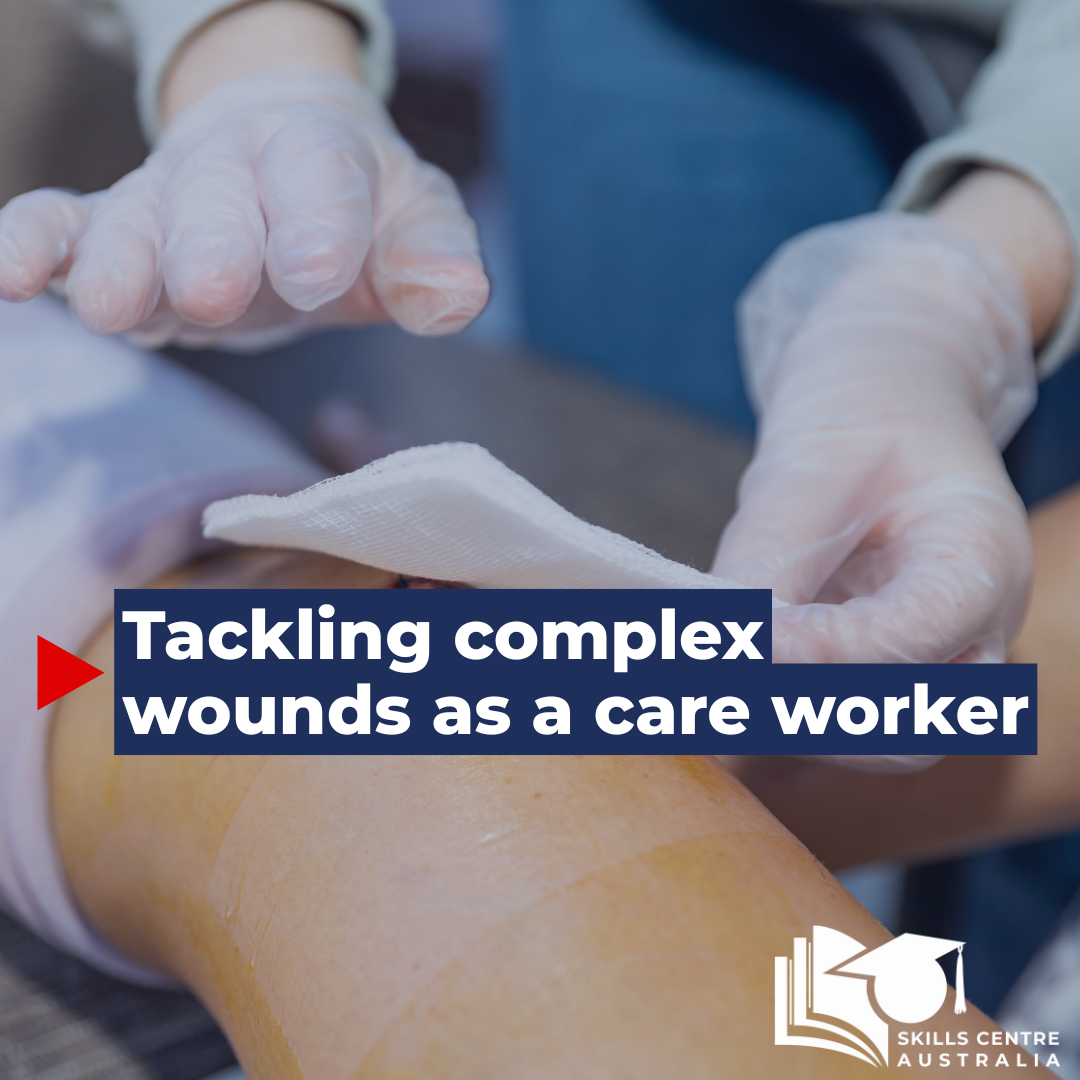Behind the walls aged care facilities, hospitals, and homes across Australia, an invisible health crisis is unfolding—wounds that refuse to heal. When left untreated, these wounds can lead to severe medical complications. Yet, with timely, specialised intervention, outcomes can be dramatically improved. Complex wound care is more than a clinical task, it is a vital, often lifesaving necessity that reduces healthcare costs and restores patient dignity.

What is complex wound care?
Complex wound care refers to the management of wounds that fail to progress through normal healing phases. They often arise in individuals with underlying conditions such as diabetes, poor vascular supply, immobility, or chronic illness. It can also involve multiple layers of skin, muscle, or bone. Common types include:
- Pressure injuries,
- Diabetic foot ulcers,
- Venous and arterial leg ulcers, or
- Surgical wounds that become infected or stalled.
Globally, nearly 34% of people with diabetes will develop a foot ulcer in their lifetime—and up to 20% may eventually face amputation. Pressure injuries alone cost the nation an estimated $9.11 billion annually, including $3.59 billion in treatment costs, yet up to half are preventable in clinical settings.
The benefits of early, specialised care
Timely and structured intervention in complex wound care delivers:
- Faster, safer healing: Techniques like negative-pressure wound therapy (available in modern clinical programs) accelerate recovery and significantly reduce infection.
- Reduced hospital stays and costs: Pressure injuries prolong hospital stays by nearly 24 days, adding over $49,500 per patient. Early referrals to specialist clinics halves both healing time and system-wide cost burdens.
- Better patient quality of life: Preventing progression to severe wounds avoids debilitating outcomes, such as limb loss due to diabetic foot complications. They also take a heavy physical and emotional toll.
- Holistic, interdisciplinary care: Specialists do not just treat wounds. They connect patients to educators, dietitians, and surgeons, ensuring every aspect of healing is addressed.
The cost of inaction
When complex wounds are neglected or poorly managed, the consequences can be severe. Chronic wounds provide an entry point for bacteria, which can lead to bloodstream infections and potentially fatal sepsis. In diabetic foot ulcers, infection can advance to the bone, resulting in tissue death and amputation in up to 20 per cent of cases. Beyond the human toll, untreated wounds significantly increase healthcare costs due to prolonged treatment, emergency interventions, and lengthy rehabilitation.
Delays in wound healing also exacerbate existing health conditions, such as cardiovascular disease or compromised immunity, complicating recovery and increasing the risk of further complications. The physical pain and emotional distress caused by chronic wounds can lead to reduce mobility, social isolation, and loss of independence, affecting quality of life. This reality highlights the urgent need for early, specialised wound care to improve outcomes, preserve wellbeing, and ease the strain on healthcare resources.

The crucial role of education and training
For healthcare workers, being equipped with evidence-based skills in complex wound care is non-negotiable. This includes:
- Identification and assessment: Using best-practice tools to stage pressure injuries or diabetic wounds.
- Advanced therapies: Including negative-pressure wound therapy, antimicrobial dressings, irrigation protocols, and novel treatments, like growth-factor gels or photodynamic therapy.
- Multidisciplinary coordination: Promoting referral pathways, nutrition support, off-loading strategies, and ongoing monitoring.
- Prevention strategies: Especially in high-risk settings, like aged care facilities and hospital wards.
- Quality improvement and audit: Implementing protocols that have achieved long-term infection rate reductions.
At Skills Centre Australia, we offer a dedicated Complex Wound Care course, designed to equip healthcare workers with the knowledge and practical skills needed to effectively prevent, assess, and manage complex wounds. We explore evidence-based strategies and provide a comprehensive overview of the integumentary system, infection control, and scope-appropriate interventions.

Complex wound care is far more than a technical intervention, it is life-saving, cost-saving, and dignity-preserving work. With data showing billions in unnecessary costs and preventable harm, the need for skilled, evidence-based practitioners has never been clearer. Investments in training today means fewer wounds escalated, fewer amputations, less hospital stays, and thousands more lives kept whole.
For healthcare workers, engaging in complex wound care education is not just a career boost, it is an act of service with profound impact. If you are interested in Skills Centre Australia’s dedicated Complex Wound Care course, gives us a call today on (08) 8340 6875 or visit our website.


